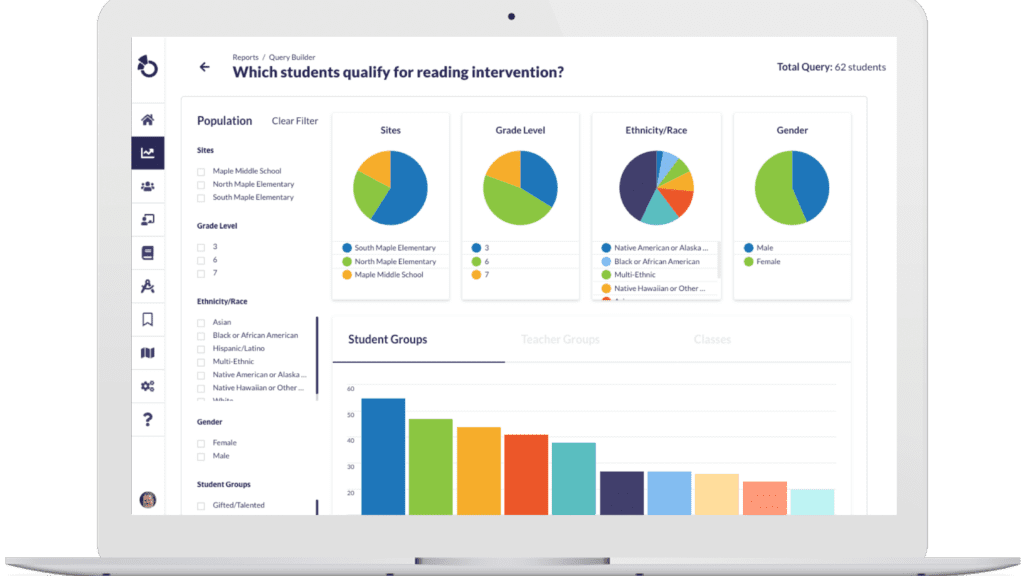Do you ever find yourself wondering: What is more difficult than it needs to be? That was the question I asked myself and my colleagues over a decade ago, and this sparked the idea for Otus. When we set out to develop Otus, our goal was to better understand who students are so we could maximize their learning. From this idea, Otus grew into a prototype I used in my own classroom, and finally, into a tool used by districts and teachers nationwide. With our growth, the number of features has also grown tremendously. And yet, some features no longer align with our goal of providing a streamlined platform to benefit users aiming to maximize student learning. While Otus has grown and evolved, our commitment to building a product for teachers – and with teachers – to deliver better outcomes for students remains.
We know that, more than anyone else, it is the educators using our tools who know best about what is working for them and what is not. That is why we pride ourselves on not only listening to the feedback you share with us but acting on it. In recent years, Otus users have shared with our team some incredibly valuable insight into how our tools are used in your schools. Using this information, we are working to build a better Otus, which includes sunsetting some features and focusing on improving existing features to better serve your needs. By retiring Otus features that do not support your efforts in the areas your feedback and our research have indicated are most impactful – standards-based grading, common assessment, progress monitoring, and data for PLCs – we are able to better focus on improving the existing features that support your efforts, accelerate student learning and maximize student growth.
Outlined below are updates you should be aware of, all of which we hope to hear your feedback on as we continue this process.
Upcoming Changes to Otus
These features will be sunset throughout the summer leading up to the 2022-23 academic year.
iPad App & Phone App (iOS & Android)
Spreading our resources across three apps has led to limitations in what the mobile apps can provide and we have heard feedback about those limitations; users want more of the full Otus experience. By sunsetting these apps we will be able to devote more resources to improving Otus’ responsiveness in mobile browsers, bringing a more complete Otus experience to users on mobile devices. As an alternative to the iOS and Android apps, users can open Otus in any mobile web browser.
Bubble Sheets
The partner who helped Otus provide Bubble Sheets no longer supports the integration method that made this feature possible. We are stepping back to re-evaluate the demand for this feature and, if there is a demand, determine how we can better serve those needs. As an alternative, users can still enter grades using Advanced, Simple, and Rubric assessments. Districts may also leverage our Assessment Building service to transform paper and pencil assessments into Otus assessments.
Analytics Module Features
Our Blog Analytics and PFT (Physical Fitness Test) features
have seen minimal use and no longer fit within our main focus areas for a streamlined platform. Teachers will still see their students' blogs, but the engagement reports will be removed. We have limited districts utilizing the PFT feature and several states are considering revising their requirements for this information. As an alternative, teachers can use Rubric Assessments or the Plans feature to capture PFT data. If you have concerns about retrieving your current data, please reach out to your Client Experience Partner (CXP).
Calendar Module
Our Calendar module has seen limited use and according to user feedback, it is too limited in its features and inconsistent in performance to offer the full benefit. As a result, we are removing the Calendar module, including the Google Calendar integration. This change allows us to free up resources to evaluate other ways that Otus can meet the needs that the Calendar module should have better served. In the meantime, the To Do List can help provide insight into important deadlines.
Classes Module Features
We have learned that due to the heavy requirements of reporting attendance state-by-state, our Attendance feature was seeing limited use, and districts prefer to leverage their SIS for tracking attendance.
While the Attendance features will be removed, districts will still be able to upload attendance for analysis by reaching out to their CXP.
The Seating Chart and Participation features have seen minimal use and no longer fit within our main focus areas. In addition to the Seating Chart and Participation features, analytics for the Participation feature will also be removed. Teachers who still wish to use Otus to track participation can use Recognitions as an alternative.
Learning Profile & Poll Modules
Recently, both the Learning Profile and Poll modules have seen minimal use. Additionally, we have learned that educators are assessing and supporting SEL and college/career development with other resources, so the Thrively integration will also be removed. As an alternative to Poll, teachers can add questions in Lessons that serve as polls.
Let us know your thoughts
Going forward, we aim to remain focused on our central mission of providing technology that empowers educators to make meaningful decisions by acting on student growth data. User feedback has guided our growth and improvements thus far and we ask that you continue to share feedback with us. We truly rely on it. We are excited to continue our work to improve existing features we think will improve your teaching experience and further accelerate your students’ learning to maximize their outcomes.
If you have any questions or concerns regarding these changes, please do not hesitate to reach out. You can open the chat in Otus and share your feedback and ideas with us anytime.
Related Resources
Request a demo!
See exactly how Otus can help your school accelerate student growth and improve student outcomes – all while saving educators time.





